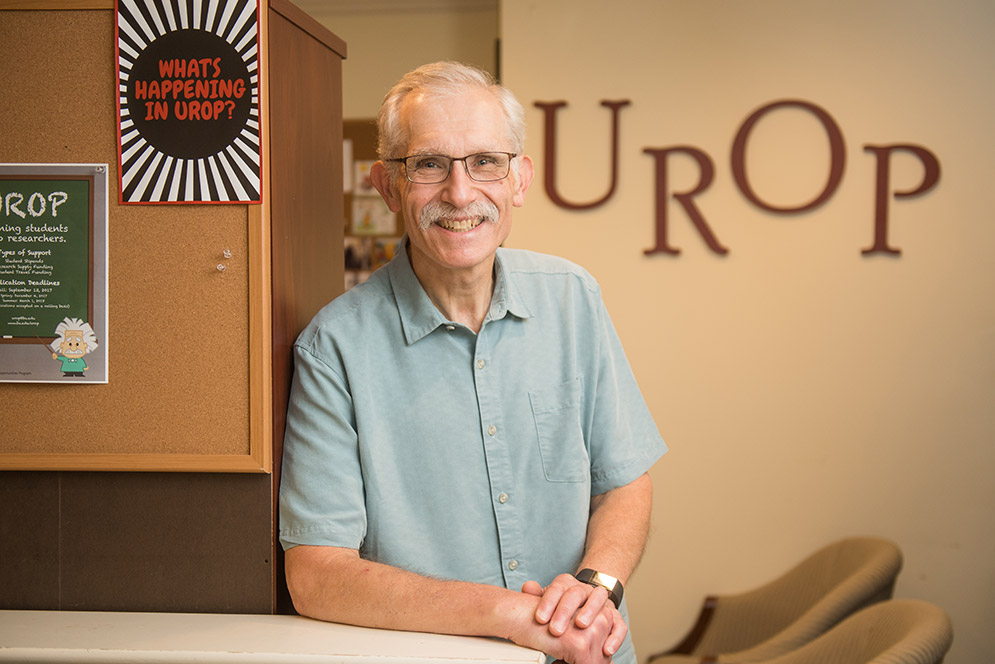John Celenza Named New UROP Head
Annual undergraduate research symposium is tomorrow at the GSU

“In my career, I’ve not only seen the fun and frustration of doing research, but I have witnessed how research allows students to take what they learn in a class, and instead of just memorizing the information, actually apply it,” says John Celenza, new UROP director. Photo by Cydney Scott
For 20 years, John Celenza has guided and mentored thousands of undergrads as they discover what it takes to conduct robust research, both through his teaching and by hiring them to work in his lab. It’s experience he’ll draw on in his new role as director of the Undergraduate Research Opportunities Program (UROP).
“I’m thrilled and a little scared,” says Celenza, a College of Arts & Sciences associate professor of biology and director of the biochemistry and molecular biology program. “I like working with students, and this is a way to try to open up research experiences for a lot of different students across campus.”
UROP, now celebrating its 20th year, pairs students with faculty mentors and provides funding for their projects in the humanities, natural sciences, medicine, the arts, and education. During that time, the program has connected more than 4,000 BU undergraduates to research opportunities both in Boston and abroad. Current available projects for students range from interdisciplinary gender studies in Africa to learning the interplay between eye movements and vision, and they are in fields from archaeology to speech pathology.
Tomorrow is the annual UROP symposium, where students present about their research projects. The program’s scope has grown significantly since it began, Celenza says. The 1999–2000 academic year saw 39 awards totaling $80,728 handed out. In the 2007–2008 school year, the program distributed 162 awards worth $265,800. Last year, 2016–2017, the total was 525 awards equaling $1,052,290.
Celenza succeeds Paul Lipton (GRS’01), a CAS research associate professor of neuroscience and director of the undergraduate neuroscience program, who led UROP for the past three years. Lipton left the post this summer to become an associate director of the Kilachand Honors College. Under his leadership, UROP broadened the range of disciplines it offers, developed new partnerships across campus, instituted annual awards to recognize outstanding student researchers and faculty mentors, and expanded the annual Undergraduate Research Symposium.
“Through extensive conversations with Professor Celenza about his aspirations for further developing the program’s multidisciplinary reach and impact, it is evident that his enthusiasm and portfolio of high-quality research, influential mentoring, and collaborative leadership are an ideal match for leading UROP,” says Jean Morrison, University provost, noting that “his commitment to creating and supporting opportunities that align with the new BU Hub curriculum and requirements presents a host of truly exciting possibilities for the program and its future within the University’s scholarly ecosystem.”
An internationally recognized biologist whose research explores plant growth, defense, and metabolism, Celenza has published dozens of articles and regularly lectures at conferences around the world. He is a graduate of Adelphi University, earned a master’s and a PhD in genetics and development at Columbia University, and did postdoctoral research at MIT’s Whitehead Institute for Biomedical Research.
Celenza is no stranger to UROP. He has been both a mentor on student projects and a member of the UROP award review committee for the last 11 years. For more than two decades, he has taught thousands of students in his genetics lecture and laboratory courses and mentored dozens of undergraduate researchers in his plant biology laboratory. In addition, as biochemistry and molecular biology program director since 2004, he has advised hundreds of aspiring scientists on postgraduate careers and collaborates with staff and faculty to develop course offerings.
“In my career, I’ve not only seen the fun and frustration of doing research, but I have witnessed how research allows students to take what they learn in a class, and instead of just memorizing the information, actually apply it,” Celenza says. “Through research, students get to take a problem apart and propose different hypotheses, test those hypotheses, and integrate their own ideas. Research means they have to work as part of a team to come up with a solution.”
He offers some advice to students thinking about applying for future UROP awards. “As you take a long survey course, try to pick out areas that really sound interesting to you,” he says. “Talk to some of your teaching fellows and see what they do. As you become a sophomore, start to write to faculty, be a little pushy. If you just wait for a faculty member to come to you, that’s probably not going to happen. Email, tell them your experiences, say, ‘I’d like to come and just shadow someone in your lab.’ You have to get your foot in the door.”
UROP’s 20th Annual Undergraduate Research Symposium is tomorrow, October 13, in the GSU Metcalf Ballroom, from 11 a.m. to 1 p.m. It is free and open to the public.

Comments & Discussion
Boston University moderates comments to facilitate an informed, substantive, civil conversation. Abusive, profane, self-promotional, misleading, incoherent or off-topic comments will be rejected. Moderators are staffed during regular business hours (EST) and can only accept comments written in English. Statistics or facts must include a citation or a link to the citation.